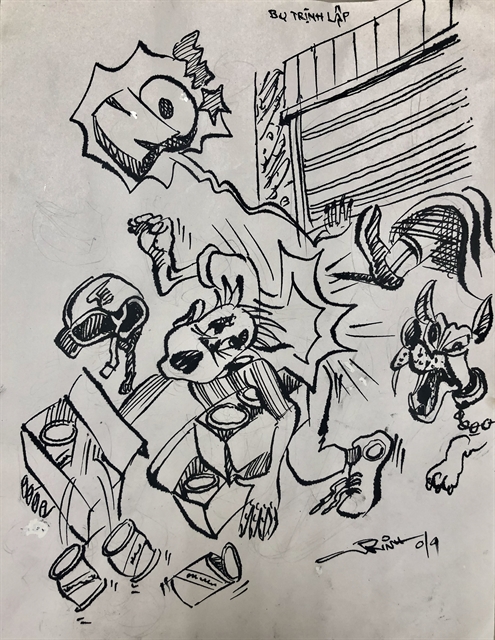
Illustration by Trịnh Lập
Khánh Dương
A GrabFood courier in HCM City is unlikely to forget the day when he stood alone on a street with 40 cups of milk tea desperately trying to call his customer.
No one appeared to pick up the order.
The driver received only VNĐ18,000 (US$0.8) as a delivery fee but had to pay VNĐ1.6 million ($68) in advance for the tea and did not know what to do when the order was cancelled only a few minutes before he reached the delivery address.
He reported the case to GrabFood and was told they were trying to deal with it.
“When we confirm that customers have cancelled the order, we will try to provide the best support for drivers including paying compensation,” a representative from GrabFood said after the incident.
Not long after that, after ordering 20 cups of milk tea worth VNĐ1.2 million ($51), a girl in HCM City texted the driver saying “I cancelled the order” just a few minutes before he was about to arrive at her house.
The driver took the cancelled milk tea to GrabFood and received compensation of VNĐ1 million ($42), which is the highest rate of compensation the company pays.
I thought these cases were only a drop in the ocean until I heard from a friend of mine. He has worked as a food shipper for six months and has tried almost every type of trending milk tea brand in Hà Nội for free due to customers cancelling their orders.
Yes, almost all, which speaks volumes about how many orders have been cancelled.
And as a consequence, he has gained weight from drinking so much sweet tea.
Searching “cancelling online orders” in Vietnamese, thousands of results show stories of this inconsiderate action with no clear reasons. It seems customers order food and clothes and then cancel the orders almost for fun without caring about the losses the drivers and online sellers have to suffer.
Public anger over a series of recent order cancellations reached a climax when a disabled female shipper livestreamed to tell everyone that she could not ring the customer after she had driven 20km from HCM City’s District 12 to District 6 to ship 4kg of fruit.
I was impressed by a photo of one driver sat on the pavement finishing a bowl of noodles which had been cancelled.
Online shop owners have even created a Facebook group to share cancellation cases and identify Facebook names and images of those who cancelled payment. Many customers have become notorious among these discussions for cancelling multiple times.
In most cases, customers make payment when they receive their products. Shippers collect their delivery fee and payment for the products.
Cash on delivery has created a chance for customers to cancel orders more easily.
Nguyễn Hồng Thắm is an online cake seller and makes cakes to order.
Thắm met a woman who cancelled her order because she said she did not have enough money to pay at the very last minute.
Unlike clothes, cakes cannot be kept for long so the bakers have to sell them to others for cheaper prices or eat them.
Vi Phượng, a clothes shop owner in Gò Vấp District, HCM City, has made a black list of customers who often cancel orders and shared it with other online shop owners.
“Some say sorry but refuse to accept the products when arrive at their houses. Others claim they made the orders but their husbands would not give them money to pay the bill. Others try clothes on and then switch them with lower-quality goods and give them back to the drivers to return,” she said.
These unacceptable reasons, real or not, are to conceal customers' lack of responsibility.
Ordering 20 cups of tea worth VNĐ1.2 million and cancelling at the last minute is like you are snatching the money directly from the driver.
Have they ever thought about the feelings of those who drive around the city all day long and receive low payments for delivery, not to mention they have to work in scorching heat or bitterly cold weather conditions?
Online orders are risky. In many cases, customers receive clothes which do not look as elegant as they do online.
The risks of online orders make customers less willing to pay in advance, instead they want to check the products first.
I think to prevent further cancellations, there should be a rule that protects both customers and sellers.
Customers must make a deposit of paying a certain amount online in advance. This aims to ensure that customers will not cancel orders at the last minute and shippers deliver products on time.
Customers should remember that making online orders with a few clicks is simple but cancelling orders and then disappearing scars others. VNS